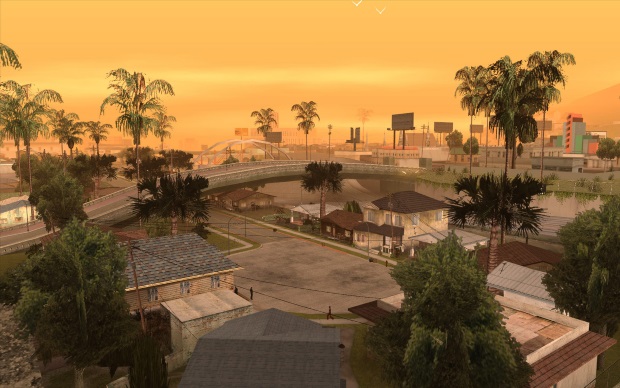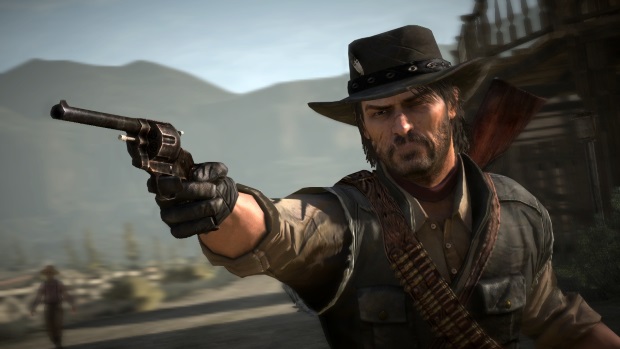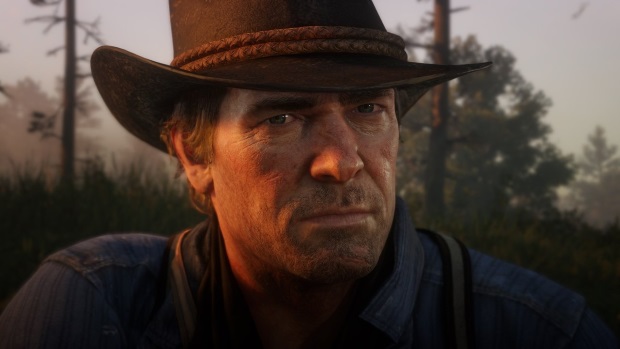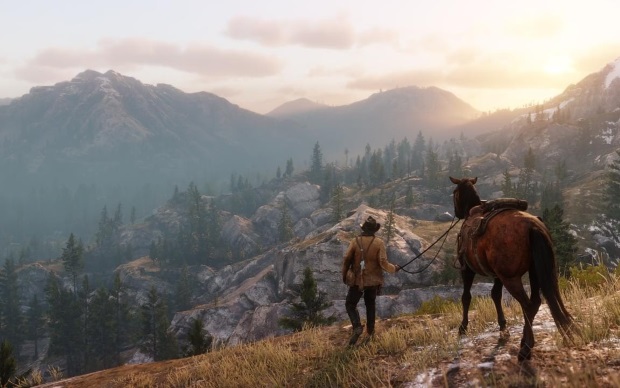Red Dead Redemption 2: What Next for Rockstar?
Playing through Red Dead Redemption II, something starts to become clear: Rockstar Games has outgrown Grand Theft Auto.
Their western opus feels like both a massive leap forward and a logical culmination of the company’s trajectory so far. With many yet to finish the game and an online version ostensibly forthcoming, it might be premature to be looking to the future, but it’s impossible to finish Red Dead Redemption II and not wonder at least a little just how it could be topped. So, considering how Rockstar has progressed so far, what might the company’s next move look like?
If one word was to characterize Rockstar’s approach to video games, it would be ambition. The studio’s advancement was swift from the top-down early Grand Theft Auto games to the 3D, open-world crime saga of Grand Theft Auto III. Then came Vice City, a game that took the same template and, realistically, the same plot, but injected it with far more personality, the soundtrack of eighties hits and neon-drenched aesthetic instantly making its predecessor look primitive.
Further Reading: Red Dead Online Hands-on Impressions
2004’s San Andreas seemed like the peak for the franchise, and in some ways it still does. The game gave you a whole state to explore, with three cities, many small towns, and vast stretches of diverse landscape to play in. Not only that, the story was a leap forward. Carl “CJ” Johnson might not have been complex, but he had a clear motive that was about more than getting rich – to win back his home and save his family. Enhancing this was the fact that said family was made up of likeable characters in their own rights, giving the open-world mayhem a sense of stakes. San Andreas ranged from street level shootouts to James Bond-esque spy shenanigans and somehow did it all within a consistent tone that balanced cartoon violence with the sense of an epic journey that left you with real satisfaction at the final victory. In what feels retrospectively familiar, it was hard to guess how Rockstar could top it.

And honestly, maybe Rockstar wasn’t sure. Bully transplanted the open world mission structure of GTA to a high school, but in terms of ambition, it wasn’t exactly on par with San Andreas. Likewise the two made-for-PSP GTA games, Vice City Stories and Liberty City Stories, were fun, but neither exactly reinvented the wheel.
In fact, Vice City Stories might provide the earliest template for what Rockstar would perfect in the Red Dead Redemption games. It might also suggest Rockstar’s way forward. While every preceding GTA featured a relatively blank-slate criminal rising through the underworld, Vice City Stories instead focused on Victor Vance, an honorable ex-soldier pulled into crime by his irresponsible brother and other forces around him. Playing Vice City Stories introduced a level of cognitive dissonance. The plot of the game, much of which centered on Vic’s reluctance to get any further into crime, didn’t exactly sit comfortably with running down pedestrians or shooting random passers-by.
The dissonance only got worse in GTA IV, a game that, rather than trying to top San Andreas for size, instead aimed for depth. With its darker tone, GTA IV was certainly a change of pace but as a playground for mayhem – arguably what people want from these games – it left a lot to be desired. Rockstar reintroduced some ridiculousness to the two DLC spin off games, The Lost and the Damned and The Ballad of Gay Tony, but neither could really shake the sense that the developer was trying to get more thematically ambitious while giving people what they wanted simultaneously.
Further Reading: How Red Dead Redemption’s Undead Nightmare Found the Fun in Horror Gaming
It was the first Red Dead Redemption that really demonstrated where Rockstar could go outside the confines of Grand Theft Auto. Structurally, it might as well have been a GTA game, a crime story set in an open world with various missions given to you by characters you meet along the way. But scoffs about it just being “Grand Theft Horse” proved wildly incorrect. John Marston, a man trying to be reunited with his wife and family, was an empathetic character with a noble goal. And while you could kill random strangers if you wanted, the honor system served as a constant encouragement to not do that – after all, John wouldn’t.
Without the expectations inherent in a GTA game, Red Dead Redemption soared. It told a sweeping, emotional story about grappling with the past to try to secure a future, but ultimately arrived in a place that suggested you can atone for your crimes, but never truly escape them. Red Dead Redemption moved many to tears and left players with a story and a protagonist worth caring about. By applying the formula to a very different kind of game, Rockstar created a beloved classic.

Subsequently, with its giant map and three protagonists, GTA V couldn’t help but come off a little like the company was trying to have its cake and eat it too. Franklin provided the rags to riches structure of the earlier games, Trevor was the character who could be as violent and psychotic as the player pleased, and Michael was, quite obviously, the character who Rockstar really wanted to tell the story about: a retired criminal pulled back into the world he left due to, I dunno, something about the economy. If you squint, he’s a bit like a less likeable John Marston. It’s arguable that GTA games need the rags to riches element to provide satisfying structure, but giving you the option to jump from struggling Franklin to rich Michael whenever you wanted took the wind out of those sails.
As a virtual playground, GTA V was unparalleled. As a story, it left a lot to be desired. Without the stakes and clear objectives of a San Andreas or the character investment of a Red Dead Redemption, there wasn’t much propulsion or incentive to complete the missions apart from making more money to buy bigger guns. You can’t argue with the commercial success of the game, but all you have to do is put it up against Red Dead Redemption II to see the difference. Both games are enormous. Both games offer jaw droppingly beautiful worlds to explore. But only one can rightly be called a masterpiece.
Further Reading: Revisiting Manhunt, Rockstar’s Horror Masterpiece
If Red Dead Redemption represented what Rockstar could do without the shackles of a GTA title, its prequel shows what the company is capable of when it not only has a popular property, but one it knows will reward depth and thematic ambition. Every character feels fully realized. The plot is both gripping and tragic. The tone is perfect – melancholic with moments of fun and epic import that never feel out of step with each other. The honor system is more than just a reminder to maybe not be a jerk. How good a person you are in the game has genuine consequences. Beyond that, it enriches its predecessor in the most surprising and devastating ways.
Arthur Morgan starts out as a pretty straightforward Rockstar thug. Then comes the reveal that he is suffering from tuberculosis and only has a few weeks to live. Suddenly Red Dead Redemption II becomes a very different game. Arthur is forced to look at his own actions and the actions of the gang he has devoted his life to. The final stretch becomes about saving John Marston from suffering Arthur’s fate. The worst part is that Arthur succeeds. If you take the honourable route, then he dies smiling, content in the knowledge that John escaped with his family and will be okay. Except we the players know that not only will John eventually be cut down by lawmen’s bullets, his son Jack, who Arthur cared for and protected, will take up the mantle as a vengeance-seeking bounty hunter himself, continuing the cycle of violence. Rockstar took advantage of audience familiarity and love for the previous game to widen the scope and turn the games into an epic saga of revenge, regret, and redemption.

It’s not even the first time the company tried something like this. Vic Vance from Vice City Stories was initially introduced as a criminal shot to death in the first scene of Vice City. Knowing his fate from the earlier game lends the later one that much more power. Red Dead Redemption II pulls the same trick on a grander scale.
But what, if anything, does it mean for Rockstar’s future?
The prevailing wisdom is that another GTA will be next, but given the constraints of what people want from that series, it’s hard to imagine that Grand Theft Auto VI will really allow Rockstar to step up the game in any way but the technical. Undoubtedly it will be good, but it’s hard to shake the sense that the perfect GTA was probably San Andreas, which both nailed the formula and provided a hard-to-top benchmark. Ensuing games have certainly been more impressive technically, but haven’t struck the same balance between fun and a reason to care.
As such, would Rockstar be best served moving on from its flagship series? It’s doubtful it would ever happen, but it seems fair to suggest that far more passion went into Red Dead Redemption II than GTA V. Does that suggest a future made up of cowboys rather than car chases?
Further Reading: Revisiting Red Dead Redemption
While I wouldn’t bet against another Red Dead being fantastic, what was pulled off in the second game feels like a trick that would be hard to manage again. Both games take place near the very end of the Wild West era. As such, the only real options would be either another prequel, perhaps focusing on a young Dutch or Hosea, or a sort of interquel that picks up the story of either Charles or Sadie Adler. But it’s hard to imagine what either approach could do that we haven’t already seen in the previous Red Dead games. Even a pre-prequel with built-in tragedy based on knowing the outcome would still essentially be a repeat of Red Dead Redemption II.
After two games that were so closely interlinked, a hypothetical third that focused on a new set of characters in a different corner of the west couldn’t help but feel like an outlier running the risk of diluting the brand somewhat. If I were Rockstar, I would be avoiding returning to the Red Dead well. One advantage of the Grand Theft Auto series is the ability to refresh by choosing a new city to focus on each time (even if they’ve only ever used three). The Wild West doesn’t exactly offer the same malleability.
Of course, Grand Theft Auto and Red Dead Redemption aren’t Rockstar’s only titles. Sequels to L.A. Noire and Bully have been mooted for a while, although it’s uncertain whether either could achieve the same popularity as the other two franchises.
The open world formula, by its very nature, is one that offers countless possibilities. What Rockstar does so well, what made both Red Dead Redemption games so special, is telling a highly directed story in these worlds in ways that allow every player’s experience to be slightly different while still following the same fundamental narrative. When the story is over, well, there’s always so much left to explore. That Rockstar’s work is indebted to cinema is well known, and thus far every one of its open world games has existed in the tradition of a different beloved genre, from gangster, to western, to noir, and even high school. If any educated guess was to be made regarding the company’s future direction, then that pattern alone suggests several tantalizing possibilities.

In the wake of Red Dead Redemption II however, it feels like another Grand Theft Auto is the least exciting direction the company could go in, unless it gave the series a major overhaul – i.e., telling the story from the perspective of a policeman or something. Even then, GTA seems weighed down by too much baggage to really innovate in the same way that Red Dead has so successfully done twice.
What the Red Dead Redemption series represents is the potential for video games to tell sprawling stories with a deeper emotional pull than many television shows or films. Instead of just making a fun cowboy game as an extended trailer for Red Dead Online, Rockstar told a powerful story that took advantage of the love for its predecessor to create one of the greatest recent westerns, regardless of medium.
By allowing us to become Arthur Morgan and, at least to a degree, shape what kind of a man he is, our investment in his fate and ultimate sacrifice becomes enormous. Is it an illusion? Sure. We don’t decide what happens to Arthur any more than we decided the fate of Walter White or Michael Corleone. But in a way, that underlines the point. Arthur’s fate is sealed early in the game. What’s left to him is only to decide what kind of person he wants to be in his last hours. That much is in our hands, and in making that choice, Rockstar reels us in and makes the final devastation of the game that much more acute.
Further Reading: What Capcom’s Red Dead Revolver Would Have Looked Like
This achievement is inarguably far more impressive than the potential of a new GTA with a really, really big map and six interchangeable protagonists. It’s proof, if proof were needed, that video games can not only tell stories on a par with film but can provide an interactive experience that would be impossible to replicate in any other medium.
What makes Red Dead Redemption II so great is that the scope of its world and the depth of its story complement each other to create something truly singular. If Rockstar’s development thus far is anything to go by, that’s something that will provide a platform for greater advancement to come. Strong themes, characters we can invest in, an embrace of whatever genre Rockstar chooses to play with, and engaging stories that take advantage of the video game format provide the clearest path to pulling off the same trick again.
Rockstar doesn’t make bad games. Even titles they could have phoned in such as Vice City Stories are strong in their own right. If we can learn anything from the trajectory of the company, it’s that ambition will always push it to greater heights. Sometimes the push won’t be enough. Other times, you end up with something as spectacular as Red Dead Redemption II. As long as Rockstar keeps that ambition alive, the chances of hitting those heights again remain high. I wouldn’t bet against this studio.